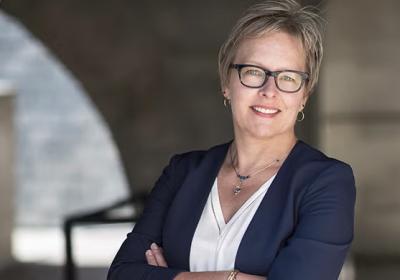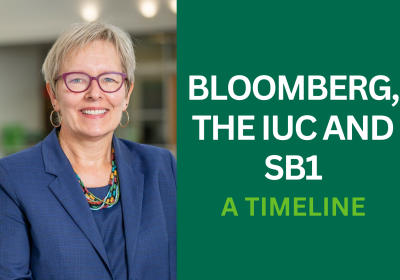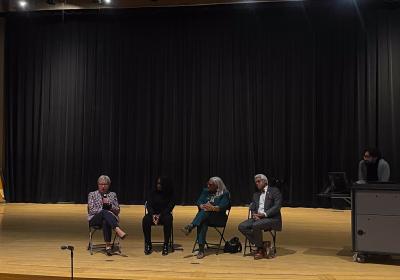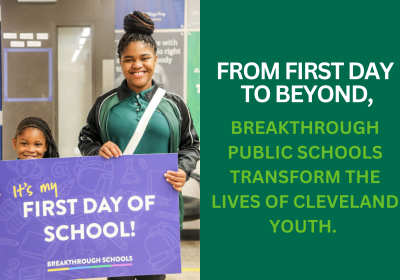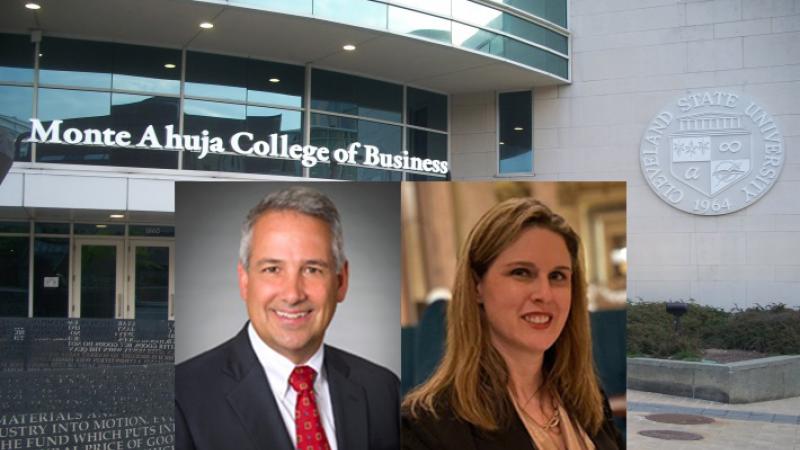
Sherwin-Williams, Eaton Corp. discuss business strategies for dealing with COVID
Cleveland State University associate professor of management, Tracy Porter, on Oct. 28 moderated a virtual business discussion between representatives from Sherwin-Williams and Eaton Corporation. The senior representatives of the prominent Cleveland businesses outlined how their companies had and continue to deal with the coronavirus pandemic.
Carolyn Lekan, vice president of Human Resources at Sherwin-Williams, and Steve Pilotti, vice president of the Industrial Sector of Human Resources at Eaton, joined Porter to address “What Should Stay and What Should Go?” in their respective company's missions to move past COVID-19 complications.
Lekan has worked in her field for 23 years. She earned a bachelor’s degree of business administration and management and a master’s degree under the same program at CSU before starting out in the job market as an intern.
Pilotti graduated with a bachelor’s degree in business administration from CSU before attending Case Western Reserve University and beginning his career.
Both speakers discussed what got their companies through the beginning of COVID-19’s challenges in the business world, what they’ve been learning from the experience and how Sherwin-Williams and Eaton will maintain their focus on beating COVID-19 moving forward.
“We were using [Microsoft] Teams before, but now it’s different [because] we’re hybrid,” Lekan said. “What’s going away is putting a focus on who’s where and when.”
Just as many other businesses around the world have been forced to transition to less in-person and more virtual meeting time, Sherwin-Williams and Eaton pivoted to ensure their staff and customer needs were met.
"We did have somewhat flexible work schedules and we did have some people who were working remotely," Lekan said. "But it was a very small percentage.”
COVID-19 pushed the company to change and expand options for employees to remain productive while staying safe.
“We’ve upgraded our technology to improve collaboration and also ensure that we have the appropriate security in place,” Lekan said. “We moved to the Microsoft suite of collaboration tools including our Team’s platform, very similar to Zoom, with the ability to meet with people and look at each other face-to-face while sharing material.”
Pilotti said that COVID-19 caused Eaton to make changes necessary to keep working, despite the pandemic.
“We were able to pivot very quickly,” Pilotti said. “Our flex-work practices had been deployed a couple of years in advance of COVID, but I must say that our uptake wasn’t great. Some of that was maybe due to cultural issues or managers weren’t really up for those arrangements, but we had a framework.”
Cultural divide in slowing the spread of such a universal virus caused a few bumps in the road for many companies. However, those issues did not stop Eaton and Sherwin-Williams from staying focused on their core businesses. Technology was key.
“Other things that really helped us when we had to go virtual for a period of time were our IT [information technology] system,” Pilotti added. “We had already made the move to Microsoft Office and we were using Teams, Outlook and OneDrive. That really helped us adapt quite rapidly.”
The complexity of getting through the actual work however, didn't seem to be the most important takeaway in learning about how global businesses have grown in the wake of challenges that COVID-19 presented.
Lessons learned at a deeper level
The “Lessons Learned” topic within the panel focused on some of the difficulties and solutions the companies have faced.
"Progress is better than perfect," Pilotti said “You don’t have to get everything perfect before you move forward. Otherwise, you won’t make a decision, because things are going to continue to change.”
Adding to Pilotti’s comments, Lekan picked up on the roles of communication and adaptation.
“There is no such thing as overcommunication,” Lekan said. “Be flexible and adaptable. We’ve been working with our leadership to model these new norms.”
Question time
The speakers later took questions from the audience. One specific question focused on the difficulties of tax issues during COVID-19.
“There is an expectation based on our tax agreements with the country that people are coming to work,” Pilotti said.
With both companies collectively totaling over 140,000 employees in 125 countries, Lekan explained, “we are going to be tracking our employees’ flex-work schedules so that we can tax appropriately.”
"Every municipality is dialing for dollars," Pilotti added.
The panel and discussion highlighted how these two companies are working to combat the hardships that the virus has created for their business models, their staff and their customers.
On one core impact of COVID-19, Lekan was clear.
"You can survive with 100% remote work, but you cannot thrive."




